The juicy details
This article was originally published in July 2017
Fruit and vegetable juices are an outstanding source of potassium, an essential mineral that helps keep blood pressure levels within a healthy range. Potassium also supports bone health and is an essential electrolyte important for staying hydrated in the summer months. Many juices also provide additional vitamins, minerals and antioxidants that may improve cardiovascular health. Here PCC nutrition educator Nick Rose recommends few favorite juices at PCC, each with unique health benefits.
Lakewood Organic Super Beet Juice
Lakewood is a fourth-generation family company making premium organic juices. There are three pounds of organic beets in each bottle! Beet juice (and other nitrate-rich vegetable juices) help lower blood pressure and support cardiovascular health. Beets also contain betalains, phytonutrients that have anti-inflammatory and detoxification benefits. This juice adds beet puree to the juice so that a serving contains a bit of fiber, which most juices don’t. Add a splash to sparkling water or a smoothie to boost flavor and nutrition. Find it in the shelf-stable juice department.
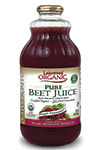
Per 8-ounce serving:
- 120 calories
- 21g sugar
- 3g fiber
- 4g protein
- 750mg potassium
- 50 percent daily value folate
Lakewood Organic Pure Tart Cherry juice
Adding a splash of this bright juice to a glass of sparkling water also makes for a delicious treat — and helps stretch each bottle of this special organic juice. Tart cherry juice is a great source of unique antioxidants that have been researched for their benefits in supporting relaxation, sleep, cholesterol levels and blood sugar management. Tart cherries also are one of the most potent anti-inflammatory fruits. Find it in the shelf-stable juice department.
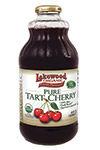
Per 8-ounce serving:
- 120 calories
- 23g sugar
- 350mg potassium
- 30 percent daily value vitamin A
Knudsen Hibiscus cooler
This juice blend reduces the total amount of sugar 25 percent by replacing some of the apple juice with hibiscus tea, a great source of antioxidants that support blood vessels and may help manage blood pressure. Find it in the shelf-stable juice department.
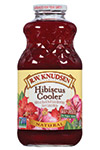
Per 8-ounce serving:
- 100 calories
- 20g sugar
- 210mg potassium
Evolution Organic V
Made from organic carrots, celery, beets, spinach, apples, lemon, limes, parsley and ginger, this low-calorie cold-pressed juice is packed with antioxidants to support your eyes and skin and help protect against a variety of cancers, while providing as much potassium as two bananas. Find it in the fresh cooler.
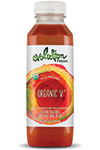
Per 8-ounce serving:
- 70 calories
- 14g sugar
- 620mg potassium
- 260 percent daily value vitamin A
WTRMLN WTR (Cold-pressed watermelon juice)
Another delicious option for those seeking a low-calorie juice, WTRMLN WTR is made from watermelon “seconds”— fruit that’s ugly but perfectly delicious, so drinking it helps prevent food waste! Watermelon juice is an outstanding source of lycopene, the same antioxidant found in tomatoes that is known to support heart, bone and prostate health. One of the lowest-sugar juices available. Find it in the fresh cooler.
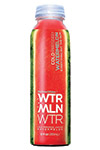
Per 8-ounce serving:
- 60 calories
- 15g sugar
- 550mg potassium
- 60 percent daily value vitamin C
Genesis Organic Apple Ginger Juice
This zesty organic, locally pressed juice contains just apples and ginger and is pasteurized with pressure rather than heat to maximize flavor. Ginger juice provides numerous health benefits, supporting digestion, circulation and pain management. Find it in the fresh cooler.
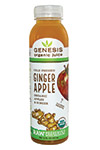
Per 8-ounce serving:
- 110 calories
- 22g sugar
- 200mg potassium
- 8 percent daily value vitamin C
Thirsty for more? Click here, PCC’s nutrition educator, Nick Rose, answers questions he’s frequently asked about the health impacts of drinking juice.
